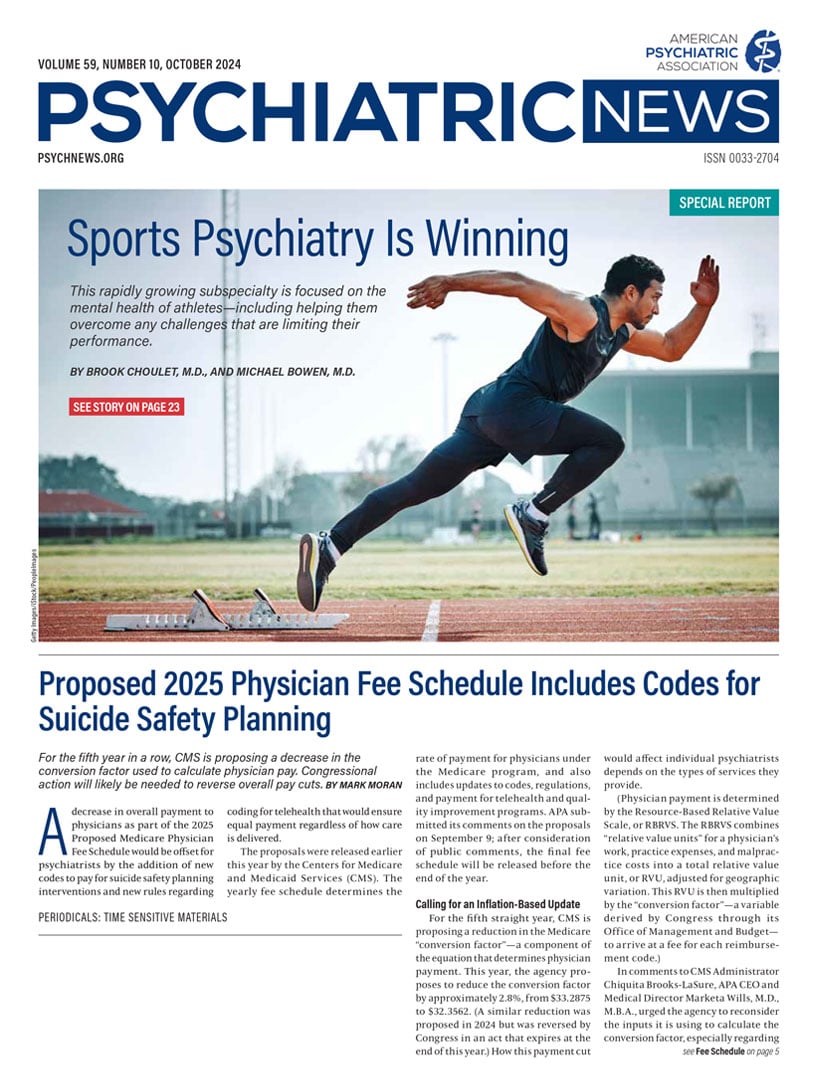Building a long-term strategic focus, strengthening budgetary discipline and diversifying revenue sources, and enhancing operational efficiency across APA governance, administration, and staff—those were the themes that APA CEO and Medical Director Marketa Wills, M.D., M.B.A., emphasized in her first report to the Board of Trustees in late July.
Wills, who assumed her position on June 1, provided an overview of her assessment of the Association strengths and those areas ripe for improvement, identified threats and opportunities, and presented a six-month action plan that was approved by the Board. That plan encompasses three elements:
•
Laying the Foundation: Establish a culture of trust, transparency, and accountability, and implement “Quick Wins.”
•
Planning and Priming: Establish the vision and strategic direction for the future; identify revenue-stream diversification options and determine where and how APA will make “Bold Bets”; proactively engage members in the process.
•
Executing Strategic Priorities: Evaluate existing programs and invest in areas of strategic importance; refine the governance model and Administration structures to prepare for the future.
Noting that APA has enormous strengths to build on, Wills gave the Association high marks for financial integrity—ensuring that its financial systems operate in a transparent and accountable manner—and for its compliance with laws, regulations, standards, and ethical practices.
She emphasized the energy and commitment of APA’s membership, the vast store of knowledge and expertise they offer, the high-value APA headquarters building in Washington, D.C., and refreshed logo, and the widely recognized excellence of APA’s intellectual property—including DSM, practice guidelines, position statements, and other resources. “We have a highly engaged membership and just a wealth of membership expertise,” Wills said. “I consider that a true asset for our organization. It’s just remarkable how much knowledge is out there and how willing our members are to work as a collective.”
A New Mindset for ‘One APA’
When it came to sharing her vision for change, Wills focused largely on moving the Board and governance structure toward a more strategic, long-term outlook and away from responding to day-to-day problems. “There is an opportunity for the Board to better project a long-term, strategic mindset,” Wills said. “The Board sets the strategy, and administration and staff implement the strategy, but if we are not getting a full strategic picture, we end up being focused on the day-to-day, putting out fires, rather than being future focused.”
That extends to budget planning, with Wills emphasizing the need to clarify a long-term strategy governing APA’s use of its financial reserve funds, establish a centralized process for funding grant projects, and diversify revenue sources. She noted that DSM and the Annual Meeting are both subject to external influences—Annual Meeting attendance is up, for instance, but has still not returned to pre-pandemic levels.
“When those revenue streams are threatened, it really does cause a ripple effect for the organization,” Wills said. “The external environment has changed, and we need to really think about diversified revenue streams and how to capitalize on those.”
Wills noted that the theme of lifestyle psychiatry, championed by APA President Ramaswamy Viswanathan, M.D., Dr.Med.Sc., may help attract new sponsors for the 2025 Annual Meeting in Los Angeles.
Wills also outlined potential future threats for which APA will need to prepare:
•
Evolving workforce issues impacted by scope-of-practice legislation, retirement of senior psychiatrists, and a trend away from solo or group practice and toward salaried employment within healthcare systems
•
Competition for meetings and continuing medical education offerings
•
Artificial intelligence/augmented intelligence
•
Evolving industry trends that may impact revenue, such as the growing popularity of open access publishing
Wills said she hopes to foster a culture of “One APA,” ensuring that administration and staff at all levels are working collaboratively—as opposed to working in separate silos—toward long-term goals that will “future proof” the organization for decades to come.
“I want APA to be recognized by everyone—elected officials, governmental agencies, schools and universities, the media, research institutes, and the public at large—as the premier, go-to organization for psychiatric expertise that it is,” Wills told the Board. “I’m looking forward to working with governance, staff, and the membership to make that happen.”
‘The Future of the Psychiatrist’
In other news, the Board voted to approve the Presidential Work Group on the Future of Psychiatry’s paper “The Future of the Psychiatrist” for submission to an APA journal for publication. In 2022-2023, then-APA President Rebecca Brendel, M.D., J.D., appointed the work group with a charge to envision how psychiatrists, psychiatric training programs, and APA should be preparing for the future.
Work group member Jimmy Potash, M.D., led the group in creating the paper, which outlines how psychiatrists can play leadership roles in a variety of areas. These include development and monitoring of artificial intelligence and its use in clinical practice, collaboration across medical disciplines in care of the severely mentally ill, measurement-based care, use of mobile data, and precision medicine.
Additionally, the Board of Trustees voted to approve the APA/AACAP Parent’s Medication Guide on Bipolar Disorder, along with three new proposed position statements (in addition to 11 revised position statements). The new statements are:
•
Proposed Position Statement on Academic Freedom of Psychiatrists: It is the position of APA that academic freedom is a critical element of teaching medical students, residents, fellows, and practicing psychiatrists. The goal of open dialogue in psychiatric education is to reduce bias and promote trust. Psychiatric educators must be allowed to create and implement curricula based on best available evidence that foster discussion of complex mental health topics. Effective psychiatric education creates a knowledgeable, diverse, equitable, and inclusive community of psychiatrists, who in turn will provide mental health care to an increasingly diverse population.
•
Proposed Position Statement on Transcranial Magnetic Stimulation: Most insurance companies cover transcranial magnetic stimulation (TMS) for major depressive disorder (MDD), but some still limit coverage of TMS for MDD and deny coverage for other evidence-based indications. Despite TMS being available for patient care, most psychiatrists lack education and knowledge about it. It is the position of APA that TMS is a safe and effective evidence-based medical treatment, when administered by TMS-trained psychiatrists for appropriately selected patients. Training in evidence-based TMS therapy for residents and insurance coverage for TMS are needed to provide access to TMS.
•
Proposed Position Statement on Substance Use Disorders in Older Adults: Substance use disorders (SUDs) among seniors is one of the fastest-growing health problems in the United States. More than 1 million adults aged 65 and older live with an SUD. It is the position of the APA that a well-trained workforce of psychiatrists and other mental health clinicians is needed to address the unmet clinical needs of older adults with SUDs and reduce the poor outcomes and deaths related to these disorders. Evidence-based integrated care models are needed to treat older adults with SUDs. ■

